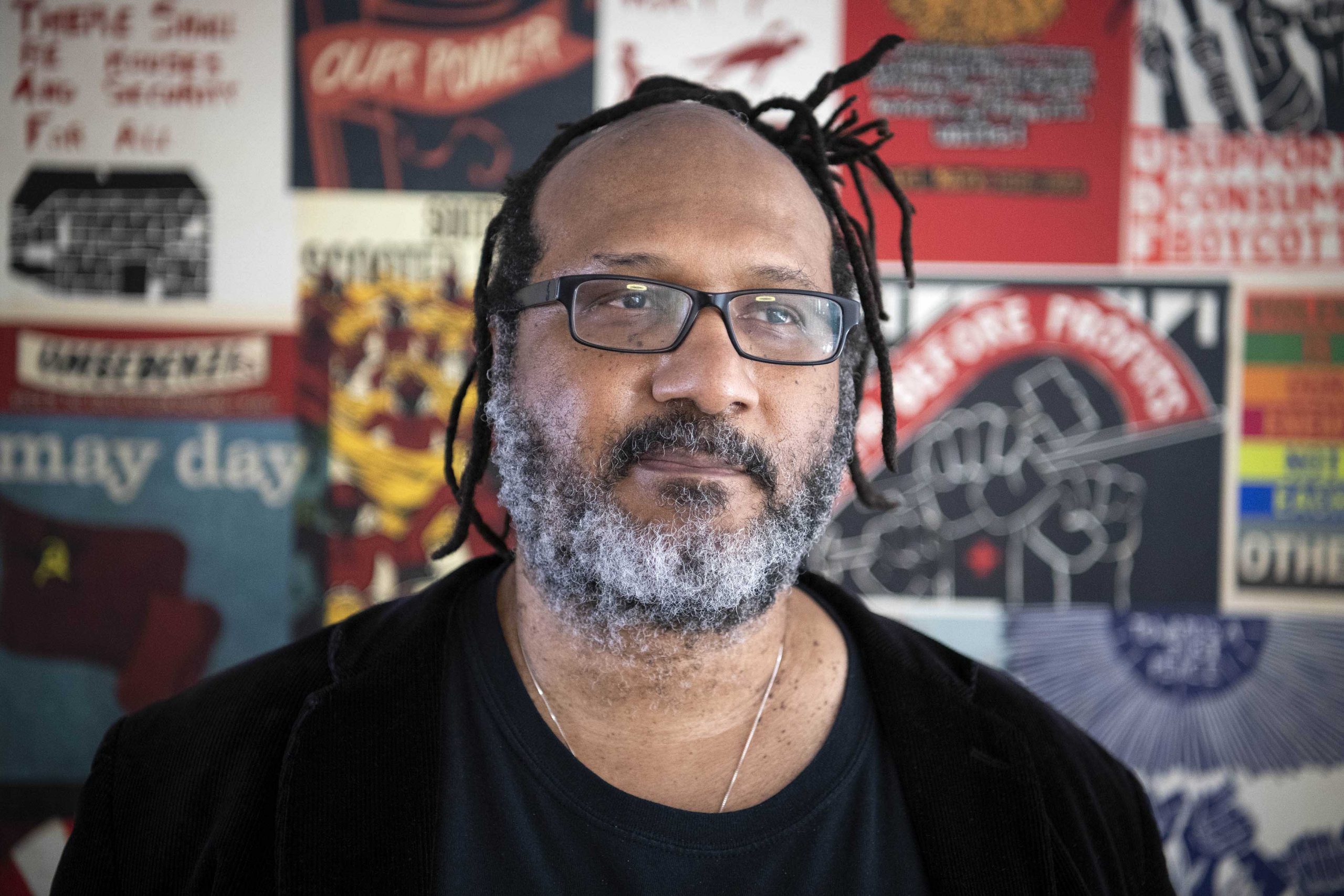Shifting the geography of reason
Postcolonial feminist Madina Tlostanova interviews philosopher Lewis Gordon about building new futures by relocating the spatial and temporal grounds of reason.
Author:
21 January 2019

Madina Tlostanova: Could you please unpack the concept of the shift in the geography of reason?
Lewis Gordon: Taking hold of building alternative futures requires a commitment to having a future at all. The geography of reason means that only certain groups of people in a specific geopolitical location called the “North” have a future and reason. The structure of the relationship is reason supposedly coming “down” to the people of the “South”. The implications are many. For example, the presumption is that through reason, people from the North offer the ideas that make people from the South appear. Those from the South thus become passive recipients of such light.
This, however, is a distortion of history and reality. It erases facts, and it cultivates dependency. Since the people of the North use reason to illuminate their experience, it also leads to the conclusion that Northern experience is more valuable than Southern experience. If the point is to bring reason to experience, then everyone must take responsibility for reason and the theory it creates. It is this taking responsibility for reason that leads to the shift. It is done without permission of those who attempt to hoard reason.
But here is the additional shift. The hoarded reason is a distorted reason. It is a form of “unreasonable” reason that imagines itself complete and standing on its own. Those who challenge it do so from an understanding of reason as an ongoing relationship and commitment to certain kinds of practices that are never “complete”. Even the future is open. They thus, in shifting the location or geography of reason, also shift reason itself from a closed to an open, relational commitment.
Related article:
The implications of these shifts are many. They involve challenging even notions of “location”. There are southern elements in the geographical north — as we see in Eastern Europe and also the many migrant and refugee groups across the world — and there are northern ones in the south, as we see with the disasters and coups and anti-democratic directions of privatising elites co-opting countries such as Brazil and India. There is also the historical inheritance from colonialism, enslavement and racism.
Another shift is the notion of “modern”. The portrait I just gave reveals that to be modern — present — one must transform or shift one’s understanding of belonging. One must belong to the future, which offers meaning to one’s present and one’s past. This means, then, if Europe is not the future but instead only a part of it, then the modern that has dominated the world for the past few hundred years is simply the “Euromodern”. Understanding this is already a shift in the geography of reason. Indeed, it enables us to look more closely at past moderns.
Related article:
If we were to use a time machine and go to the Mediterranean of antiquity and pick up some maps, we would have to turn them upside down to recognise the countries. Those maps reveal that people used to look “up” to the southern hemisphere. Africa was “above” what we now call Europe. Our world, then, is a transformation of one form of what was once modern for another, and we would be deluding ourselves if we were to think of the Euromodern as the last word on this process.
So, finally, if we think of my point about reason as an incomplete but ongoing commitment, we could see why I argued for shifting, instead of simply a shift, in the geography of reason. This shifting is a living, ongoing commitment to building liveable worlds of living thought.
MT: What are the ways, tools and spaces for shifting the geography of reason, and who are its agents?
LG: I reject zero-sum arguments. The truth is, we don’t have advanced knowledge. We must strive to shift the geography of reason at every front. Intelligence and creativity are our greatest assets, and we should use them. There is no greater enemy than a mixture of stupidity and pride. I, as you know, am not a disciplinary nationalist. I also reject the idea of the university as the sole province of the production of knowledge. In fact, it is part of the market colonisation of politics to corner knowledge producers through making the university their only site of production. It transforms producing knowledge from a calling and makes it exclusively into a job. At this point, the risk of unemployment becomes the surest way of closing off revolutionary thought. So, shifting the geography of reason also requires shifting the geography of knowledge production.
A shift, however, does not mean abandonment. Academic knowledge has offered many gifts to our species and, at times, has even saved other forms of life. Our mistake is to leave such a grand and perhaps sacred task only in the hands of the academy.
Academics who truly wish to learn should continue to be students, which means they should seek learning wherever they can find it. This counsel applies to everyone in pursuit of knowledge, wisdom and other forms of learning, however, which means they should transcend themselves. They should continue to grow. I advanced this argument in my book Disciplinary Decadence (2006). We should not fetishise ourselves, disciplines and methods of learning. We should be willing to go beyond them for the sake of things that matter, things greater than ourselves, such as reality and even, paradoxically, our love for each other, as love is not only an embrace but also a letting go through a profound respect for freedom.
Related article:
MT: Although I am entirely for the shift in the geography of reasoning, I am also aware of the fact that in some places and contexts it is too easy to misinterpret this decolonial gesture and let it be appropriated by reactionary forces. The contemporary official anti-Western sentiment in Russia and a number of other post-Soviet and post-socialist countries often appropriates elements of decolonial and postcolonial discourses. It is possible that the shift in the geography of reasoning can be appropriated by these populist, nationalist and imperial revivalist forces. In this situation, many critical minds opt for a liberal and hence, to some extent, pro-Western position, and automatically reproduce the same modern/colonial geography of knowledge. In the present situation, this often looks like the only accessible protest position. I am not happy with either of these stances (as they say in Odessa, “both are worse”), so is there a way out of this binary — either neo-imperial, anti-Western nationalism or derivative liberal thought? And if so, how can we defend our ideas and values from such an appropriation?
LG: I am a critic of the term “appropriation”. The human world of meaning is communicable, which means people can participate in many elements and also distort them. I take your use of “appropriate”, however, to mean something like hijacking a term for misguided purposes, which also include erasing its history — as is what actually happens in processes of whitewashing history, for example.
One of the things the right has always known is that ideas for a humane future often lack material capital with which to present their position as normative. As a result, investment in alternative sites and rebranding concepts can be quite effective for the right. Thus, there are those among the right wing in the United States who call themselves “revolutionaries”. This happens as well all over Europe, and it is so in parts of Africa and Asia.
Related article:
What’s more, the imperial reach of capitalism is such that even revolution, decoloniality and shifting the geography of reason could be commodified in the way icons of the past, ranging from Marx and Lumumba to Fanon and Guevara, could be placed on T-shirts and worn by the very kind of people who would have ordered their assassination. There is no guarantee for what our ideas will unleash.
We must have the integrity, if that were to come, to fight that as well. This was Fanon’s point about decolonisation. The skill set of those who decolonise a society may not be the best ones for building its future. To maintain their legitimacy, those decolonisers could end up yoking their society to the always-presence of colonisation. They then become those who must be overcome.
I regard shifting the geography of reason as a task that, where healthy, creates possibilities. It is, however, a possibility of human reality. It becomes a mission, then, to be proverbially realised or betrayed. The political issue, as I have been arguing, is about the commitments of those who understand its importance without guarantees. As shifting the geography of reason is part of this ongoing struggle, it could also open the door for different kinds of struggles to come, including nefarious forces that misrepresent it. We should remember, for instance, that “freedom” is a word that suffers from similar challenges. There are those who use the term to block it. It is important, for those of us committed to doing otherwise, to use it — or at least engage in necessary practices — to liberate it.
This is an edited excerpt from a longer interview first published in Russian at Colta.




